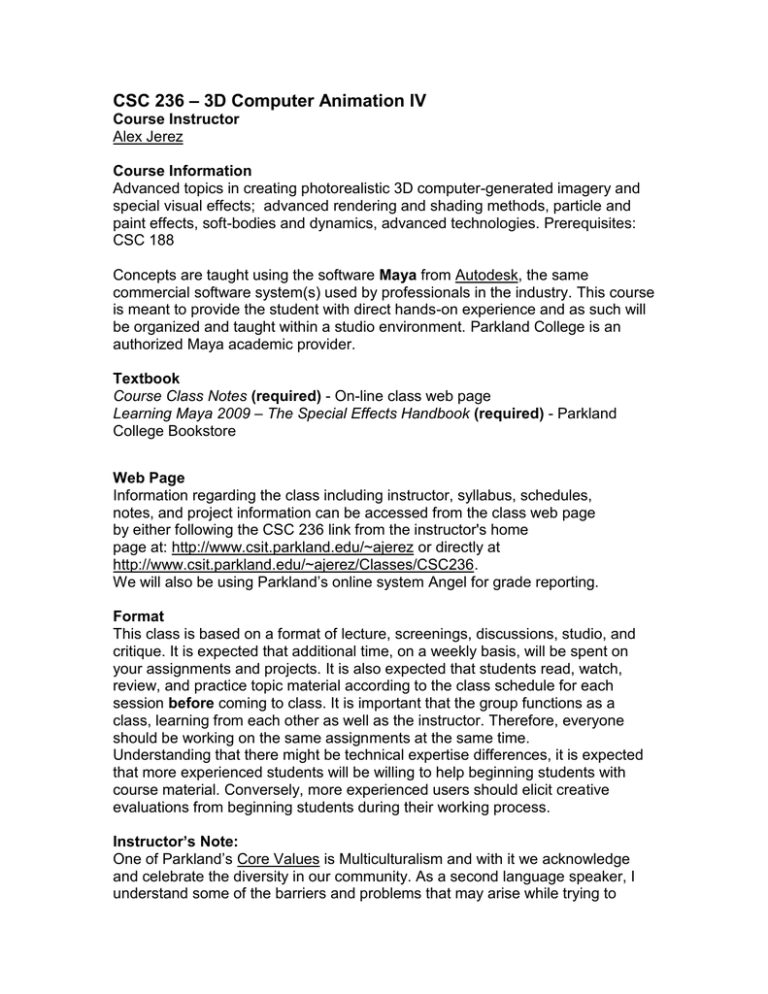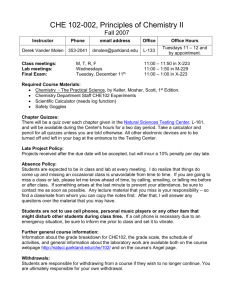3D Computer Animation IV - csit. parkland . edu
advertisement

CSC 236 – 3D Computer Animation IV Course Instructor Alex Jerez Course Information Advanced topics in creating photorealistic 3D computer-generated imagery and special visual effects; advanced rendering and shading methods, particle and paint effects, soft-bodies and dynamics, advanced technologies. Prerequisites: CSC 188 Concepts are taught using the software Maya from Autodesk, the same commercial software system(s) used by professionals in the industry. This course is meant to provide the student with direct hands-on experience and as such will be organized and taught within a studio environment. Parkland College is an authorized Maya academic provider. Textbook Course Class Notes (required) - On-line class web page Learning Maya 2009 – The Special Effects Handbook (required) - Parkland College Bookstore Web Page Information regarding the class including instructor, syllabus, schedules, notes, and project information can be accessed from the class web page by either following the CSC 236 link from the instructor's home page at: http://www.csit.parkland.edu/~ajerez or directly at http://www.csit.parkland.edu/~ajerez/Classes/CSC236. We will also be using Parkland’s online system Angel for grade reporting. Format This class is based on a format of lecture, screenings, discussions, studio, and critique. It is expected that additional time, on a weekly basis, will be spent on your assignments and projects. It is also expected that students read, watch, review, and practice topic material according to the class schedule for each session before coming to class. It is important that the group functions as a class, learning from each other as well as the instructor. Therefore, everyone should be working on the same assignments at the same time. Understanding that there might be technical expertise differences, it is expected that more experienced students will be willing to help beginning students with course material. Conversely, more experienced users should elicit creative evaluations from beginning students during their working process. Instructor’s Note: One of Parkland’s Core Values is Multiculturalism and with it we acknowledge and celebrate the diversity in our community. As a second language speaker, I understand some of the barriers and problems that may arise while trying to communicate certain ideas. If this is an issue for the student during the semester, I encourage the student to respectfully request the information to be repeated or rephrased. By no means will I take this as an insult, but instead as an incentive to make my classes clear for everyone. Cultural differences can be challenging, but I encourage everyone to see it as an opportunity to learn about other cultures and ways of living. Grading Course work will consist of large-scale project assignments and research presentations, small-scale studies and tutorials, and a final exam. The final grade will also reflect the student's class attendance and participation. The student can keep track of his grade progress using Angel Projects 70% Studies 20% Attendance/Participation 10% Total 100% 90 - 100% will receive A 80 - 89% will receive B 70 - 79% will receive C 60 - 69% will receive D 0 - 59% will receive F The instructor reserves the right to lower these criterion, but will never raise them. Projects Large-scale studio projects will be regularly assigned to develop the craft of animation techniques in the course material. Such studio projects form the basis of the student's portfolio work in 3D imagery. Given this importance, studio projects will be graded on the use of effective design principles, expressive creativity, thoughtful concept, well-executed craftsmanship, and adherence to project objectives and guidelines. Large-scale project assignments also include conducting research and delivering class presentations on course topics. Projects are due on the assigned project due date and will be class critiqued on the due date. Project imagery must be complete and stored in the designated location on the due date before class critique begins. Students will not be allowed to complete projects during class critique. Projects not completed by the due date before class critique begins will receive an F for the project grade. If a student anticipates missing class during the due date and class critique, it is the student's responsibility to notify the instructor beforehand. The absent student must have their project imagery prepared for the class critique in the designated location on the assigned due date. Failure to prepare project imagery by an absent student will also result in an F project grade. Students have the option of continuing to work on and improve each project after the assigned due date and class critique for (possibly) a better grade. Grades for re-worked projects will be no more than one full letter grade higher than the original project grade at the assigned due date (re-worked project grades will never drop in grade). All re-worked projects are due at the end of the semester. Studies Small-scale studies and tutorials will be given to introduce and develop the student's understanding and proficiency of techniques and skills. Studies will be graded on a credit/no credit basis. No credit will be given on exercises or tutorials for students absent from class. Since unforeseen circumstances may arise preventing a student from attending class, one "no-credit" study will be dropped from the final grade determination. All studies are due on the assigned due date. No credit will be given for work not completed by the assigned due date. Attendance Students are expected to be present for all class sessions - for the entire period. Peer learning and interaction is highly encouraged. It is expected that all students participate in the learning environment. For this reason, attendance is mandatory. A student’s final grade will be lowered by one full letter grade after three unexcused absences. Attendance will be taken promptly at the beginning of each period. It is the student’s responsibility to inform the instructor when they may not be in attendance. The attendance policy in this course is in keeping with the policy stated in the Parkland College Catalog. It says: "Regular and prompt attendance is expected at all classes," expect in cases involving illness or emergency which should be brought to the attention of the instructor. "Regular attendance and consistent study habits are considered necessary for academic success in college. Faculty members have prerogative of lowering grades for excessive absence." Please be careful of the language you use in your emails and during class. The anonymity of the internet and the easy-going stereotype of this field gives the wrong impression to some people that they can say whatever they want. Yes, you are entitled to present your ideas and opinions in a respectful way, but we are also entitled to request that you leave the class room if I you don’t. We expect everybody to behave professionally and to have smart discussions about their projects and their ideas. Any behavior that disrupts the class, or that offends instructors or classmates will not be tolerated. Finally, the student should remember that the person in charge of his/her academic success is the student himself/herself. If you would rather play videogames, text message, use Facebook, chat, or simply navigate while the instructor is lecturing please leave the classroom and do it at home. You are enrolled in a higher educational institution and nobody is forcing you to attend classes. Drops/Withdrawals On the ten-day roster, I am required to assess your attendance. If you have not attended regularly to that point, you will be dropped with no refund of tuition or fees. After the ten-day roster, you should not plan on an instructor withdrawal if you want to withdraw from the course. You are ultimately responsible for your own withdrawal by the withdrawal date. Non-attendance after the ten-day roster will result in an F if you don't withdraw yourself. Core Values We believe strongly in the Core Values espoused by Parkland College: Honesty and Integrity, Fairness and Just Treatment, Responsibility, Multiculturalism, Education, and Public Trust. Essentially, these values set guidelines for how we should treat you and how you should treat each other (and us). Failure to be respectful of one another or to maintain ethical behavior will not be tolerated. Computer Science and Information Technology website You can find information about the Computer Science and Information Technology Department courses and programs by visiting our website: http://www.parkland.edu/csit College Orientation Orientation to College (ORN 101) is a class that anyone can benefit from taking it covers goal-setting, career development, study strategies, library skills, time management and many other useful skills. Most sections begin the second or third week of the semester and at mid-semester. If you have any questions, please contact Ted Powers (Ext. 2312). Student E-mail Students should access their Parkland e-mail accounts at http://stu.parkland.edu/ at least weekly to obtain information about courses or college announcements. Students can go to the information desk or call 217-351-2561 for help with their student e-mail accounts. There is someone available at this number to answer questions from 2-4pm M, T, W, F. Please use the Parkland email to contact the instructor. Gmail, hotmail, and any other email domains might be filtered by the anti-spam program used by Parkland. Contact the instructor using your @stu.parkland.edu account and also read emails from there. Angel is used by the instructor to communicate with the students and you can set up Angel to forward emails to any other account you want to. Academic Honesty Unethical conduct during examinations of in preparation of assignments designated by the instructor will not be tolerated and may result in disciplinary action. All material handed in with your name on it is to be your work. If it is not you will fail that assignment and will be faced with disciplinary action. Withdrawal Procedure It is the student’s responsibility to monitor his/her progress in this course. If after consulting with the instructor, the student feels it becomes necessary to withdraw from this course, it is the responsibility of the student to do so. Please check with the office of admission to find out the final day for withdrawal with “W” grade from courses ending at midterm. If you have questions about the withdrawal procedure, see your Parkland College catalog. It is your responsibility to drop yourself from the class. Please do not assume that by stop attending to the class you will be dropped from it. As the one responsible for your academic progress, it is your responsibility, not the instructors, to keep track of it. Disabilities If you believe you have a disability, for which you may need an academic accommodation (e.g. an alternate testing environment, use of assistive technology or other classroom assistance), please contact the following person and then inform the instructor as soon as possible: Becky Osborne Coordinator, Disability Services Room X148 (217)353-2082 bosborne@parkland.edu Center for Academic Success (CAS) If you find yourself needing assistance of any kind to complete assignments, stay on top of readings, study for tests, or just to stay in school, please contact one of the following staff at the Center for Academic Success: Anita Taylor, 353-2005 Gail Hoke, 351-2441 D120 CenterForAcademicSuccess@parkland.edu Mass Notification System In the event of a significant campus emergency, Parkland College will activate its mass notification system. We encourage you to sign up for this free service and select how you would like to be notified: text message, audio message, or email message. Sign up at http://www.parkland.edu/publicsafety/alerts.htm



